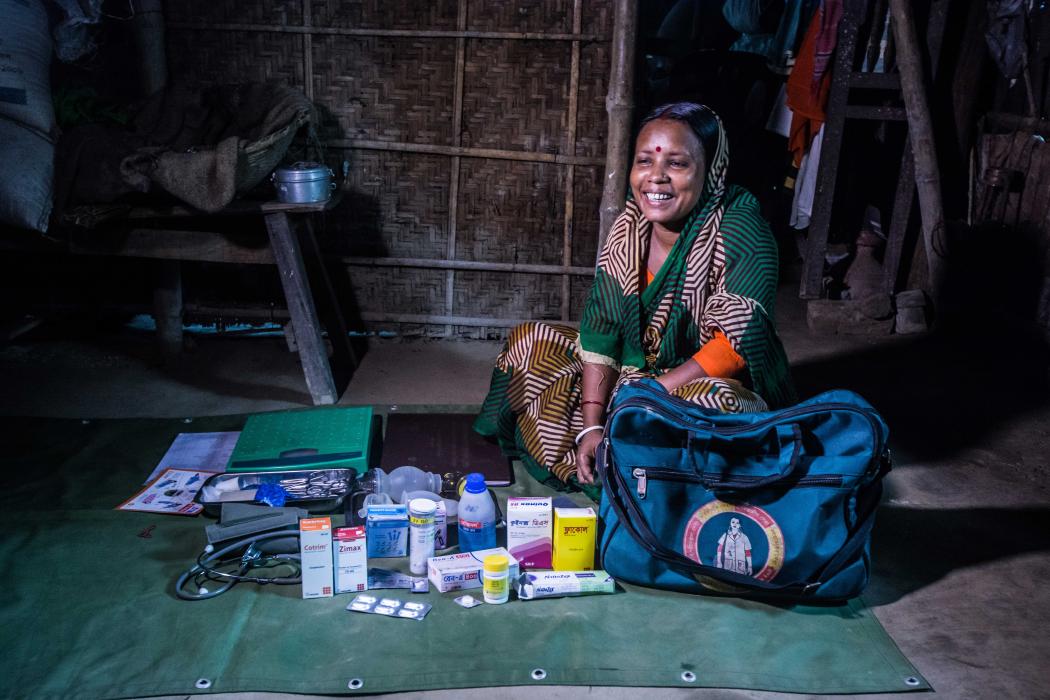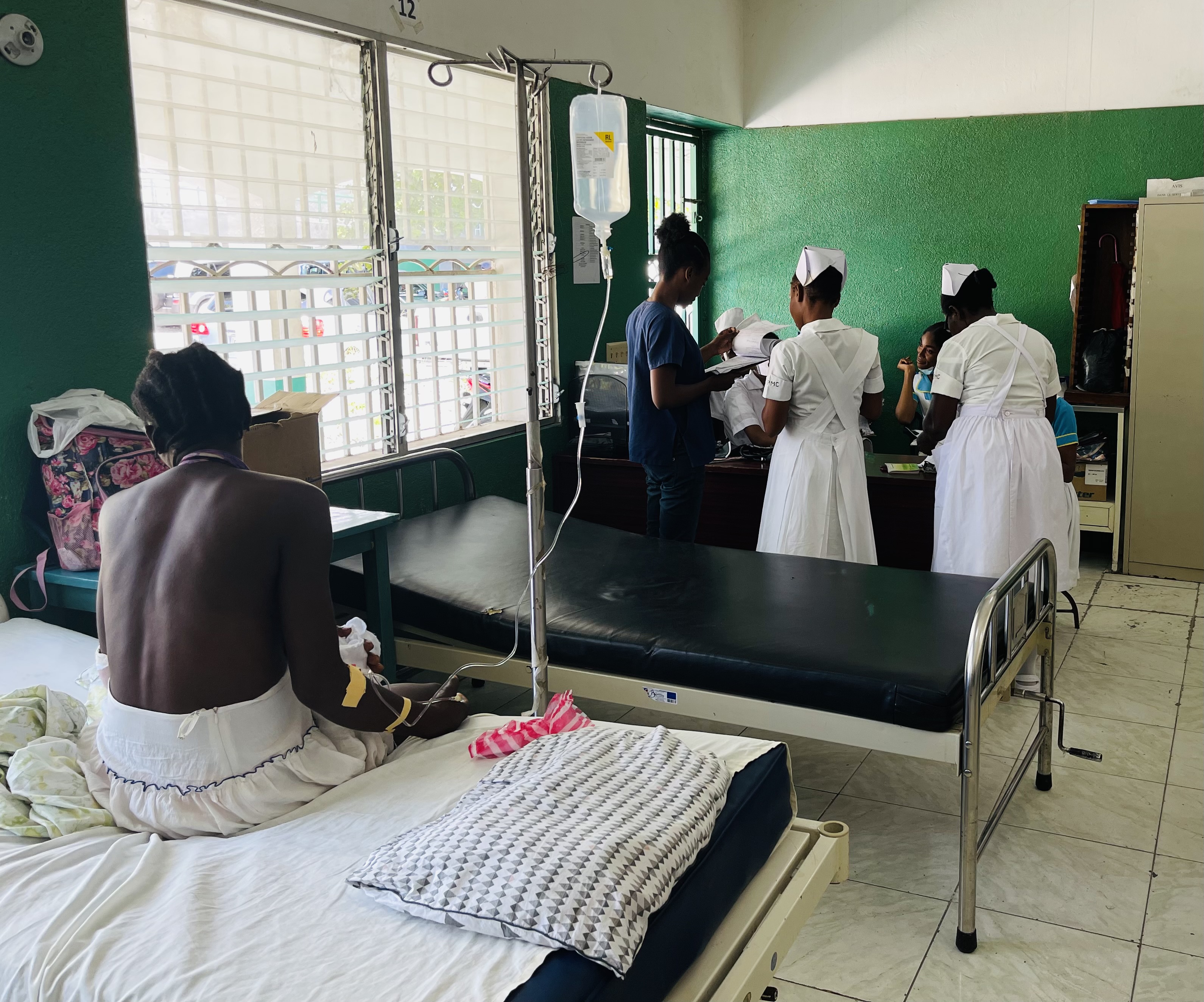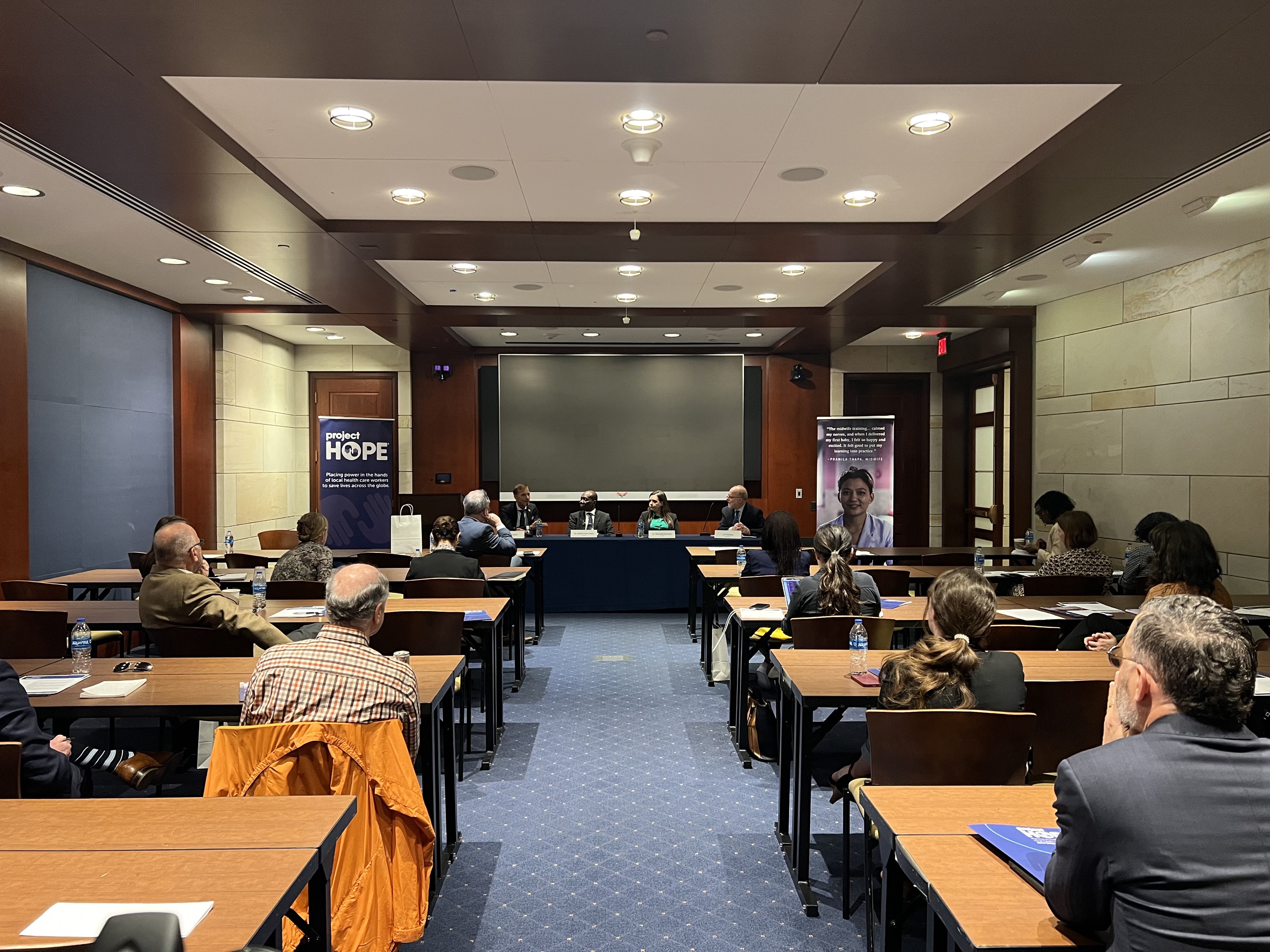A Call to Action: Governments Must Invest in Health Workers to Achieve UHC

A community health worker in Bangladesh dreams about starting a small pharmacy by saving money from her earnings. (Credit: Cesar Lopez/CARE)
Universal health coverage (UHC) will never be realized without adequate investments in frontline health workers. Half of people around the world still lack access to essential health services that trained, paid, and supported health workers can provide. The World Health Organization (WHO) estimates that the world will face a shortage of 10 million health workers by 2030, mostly in low and lower-middle income countries with Africa representing nearly half of the shortage. Current global commitments are a good start, but they will only make a difference if governments carry them out—the need for action to address the global health worker shortage and other challenges could not be more urgent.
Frontline health workers–including nurses, midwives, and community health workers—are often the first point of contact for people seeking health care and can ensure equitable access to these services, including for marginalized populations. They also play a critical role in achieving global health security and in pandemic preparedness and emergency response. Crucially, investing in frontline health workers can produce a $10 return for every $1 invested as it leads to job creation, improved health outcomes, and increased productivity. A new report by the Frontline Health Workers Coalition summarizes recent findings on return on investment in health workers, and provides five top policy recommendations for investing in health workers.
Also read the Frontline Health Worker Coalition’s report, The Case for Investing in Primary Health Care Workers: Achieving Universal Health Coverage and Improving Health Equity.

With funding from USAID BHA, Project HOPE contributes medical staff, medicine, health infrastructure support, and hygiene supplies to improve the community's access to cholera treatment and primary health services. Photo by Nadia Todres for Project HOPE, 2023
Despite the evidence on return on investment, governments all over the world are still failing health workers. For example, women comprise 70% of the health workforce, yet a staggering 86% of them are not paid or underpaid, and those who do get paid face a 24% pay gap compared to men across the health sector. They also continue to face significant barriers in accessing leadership and decision-making roles, occupying just an estimated 25% of leadership roles in health care.
UHC Political Declaration
The 2023 UN Political Declaration on UHC that was adopted by world leaders in September includes key commitments to support health workers, including:
- Accelerate action to address the global shortfall of health workers and to scale up efforts to promote the training, development, recruitment, and retention of health workers, including community health workers.
- Address inequalities, including the gender pay gap, by appropriately remunerating health workers and care workers in the health sector, including community health workers.
- Provide better opportunities and decent work for women to ensure their role and leadership in the health sector, with a view to increase the meaningful representation, engagement, participation, and empowerment of all women in the workforce at all levels, including in decision-making positions.
These commitments, if implemented by governments, could have a significant impact. Unfortunately, the Declaration lacks specifics on how it will realize the agreed commitments, including measurable targets. It mentions the need to develop an accountability framework without providing details on how to operationalize this. Even more concerning, there are no concrete commitments to increase investment in health care and to ensure gender-responsive budgeting for UHC.
Time for Action
So, on this UHC Day 2023 when it is time for action, what do we see as the necessary next steps to ensure implementation and serious investment in frontline health workers, and empower women in the workforce at all levels?
The adoption of the Political Declaration on UHC should not signal the end of an advocacy track, but the beginning. It provides a critical tool for country advocates to go into serious dialogue with their governments and urge them to take action on the commitments included in the Political Declaration and address the gaps--informed by data, evidence, and illustrations of the realities faced by frontline health workers.
Below are three key advocacy messages advocates could focus on to drive government action:
- Develop nationally costed and gender-responsive health workforce plans, which adequately renumerate unpaid or underpaid frontline health workers, close the gender pay gap among health workers, and includes comprehensive sexual and reproductive health services in benefits packages.
- Put in place transparent and fully inclusive social participation mechanisms to inform the development, implementation and evaluation of UHC strategies and health workforce plans.
- Invest in gender-transformative, multi-dimensional empowerment approaches to unleash the full potential of frontline health workers.
Seize Current Momentum in the US & Globally
In the US, there are currently two legislative actions in support of health workers around the world: House Resolution 389, which recognizes and underscores the invaluable contributions of health workers, and the proposed $20M line-item allocation for the Global Health Worker Initiative within the Senate Appropriations Bill. Both represent vital steps towards elevating support for the health workforce and achieving UHC.
Health workforce advocates in the US can actively contribute to these initiatives by contacting their representatives and urging them to sponsor House Resolution 389. Additionally, advocates can leverage social media platforms to spread awareness and express their support for these legislative actions. By educating and mobilizing others, health workforce advocates can amplify the impact of these legislative actions and champion health workers on a global scale.
Help urge support for the Global Frontline Health Worker Resolution using the Frontline Health Workers Coalition's social toolkit.

CARE, Project HOPE, and the Frontline Health Workers Coalition hosted a Congressional briefing in Washington, DC, in October to educate Congressional staffers on the global health workforce and its critical importance to achieving health development goals. Speakers included Representative Ami Bera, Dr. Mark Dybul, and frontline health workers from Sierra Leone and Venezuela. Photo by Courtney Ridgway for Project HOPE, 2023.
At the global level, the 2024 Commission on the Status of Women (CSW), World Health Assembly, UN Summit of the Future, the Pandemic Fund grants, and the ongoing negotiations on the Pandemic Accord provide important opportunities to continue to put pressure on governments to take action in the above-mentioned areas and realize UHC.
By capitalizing on this ongoing momentum, we can collaboratively chart a course toward a healthier and more equitable future, with frontline health workers playing a central role in bringing the vision of UHC to fruition. Now, more than ever, is the time for decisive action, advocacy, and investment to strengthen the health care workforce and ensure equitable access to comprehensive health care for all.
